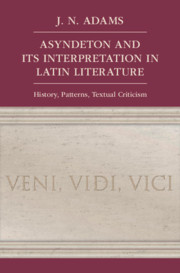Book contents
- Asyndeton and its Interpretation in Latin Literature
- Frontispiece
- Asyndeton and its Interpretation in Latin Literature
- Copyright page
- Contents
- Preface
- Acknowledgements
- Abbreviations
- Part 1 Introduction
- Part 2 ‘Grammatical’ Types
- Chapter VI Asyndetic Pairs (Mainly of Adjectives) of Which at Least One Member Is a Term with a Negative Prefix (in Latin, Usually in-)
- Chapter VII Simplex + Compound in Asyndeton
- Chapter VIII Juxtaposition of Active and Passive Forms of the Same Verb
- Chapter IX Asyndetic Pairs of Verbs of Different Tense or Mood
- Chapter X Pairs of Imperatives
- Chapter XI Masculine + Feminine Pairs
- Chapter XII Recapitulation: ‘Grammatical’ Types and Their Distribution
- Part 3 Semantic Types
- Part 4 Structures
- Part 5 Genres And Texts
- Part 6 Conclusions
- Bibliography
- Subject Index
- Index Mainly of Selected Pairs and Longer Sequences
- Selective Index Locorum
Chapter X - Pairs of Imperatives
from Part 2 - ‘Grammatical’ Types
Published online by Cambridge University Press: 13 May 2021
- Asyndeton and its Interpretation in Latin Literature
- Frontispiece
- Asyndeton and its Interpretation in Latin Literature
- Copyright page
- Contents
- Preface
- Acknowledgements
- Abbreviations
- Part 1 Introduction
- Part 2 ‘Grammatical’ Types
- Chapter VI Asyndetic Pairs (Mainly of Adjectives) of Which at Least One Member Is a Term with a Negative Prefix (in Latin, Usually in-)
- Chapter VII Simplex + Compound in Asyndeton
- Chapter VIII Juxtaposition of Active and Passive Forms of the Same Verb
- Chapter IX Asyndetic Pairs of Verbs of Different Tense or Mood
- Chapter X Pairs of Imperatives
- Chapter XI Masculine + Feminine Pairs
- Chapter XII Recapitulation: ‘Grammatical’ Types and Their Distribution
- Part 3 Semantic Types
- Part 4 Structures
- Part 5 Genres And Texts
- Part 6 Conclusions
- Bibliography
- Subject Index
- Index Mainly of Selected Pairs and Longer Sequences
- Selective Index Locorum
Summary
Pairs of imperatives, used asyndetically, are common from early Latin (see e.g. Adams 2016: 558 listing examples from the early Republic; see too XXII.4.4 for asyndetic pairs of imperatives in Umbrian). The significance of the structure (in relation to overt coordination) in the early period may be illustrated with some details about one of its manifestations, that comprising i (or ite) + imperative (see particularly the discussion of Sjögren 1900: 82–91). In Plautus (and also Terence) this type of asyndeton is commonplace, and it tends to occur in formulae or idioms suggestive of everyday speech. By contrast in Cato Agr. coordinated pairs of imperatives (with -que the usual connective) far outnumber asyndetic (by about 80:5: see Adams 2016: 80), but a factor is that most imperatives in Cato are of the -to form, and it must have been the commonplace present imperative that was usual in ordinary speech. In all examples cited below from Plautus at least one member of the pair is a present imperative.
- Type
- Chapter
- Information
- Asyndeton and its Interpretation in Latin LiteratureHistory, Patterns, Textual Criticism, pp. 128 - 137Publisher: Cambridge University PressPrint publication year: 2021



